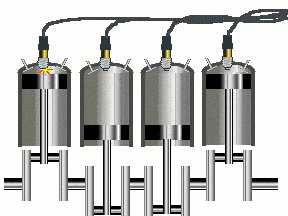We use the term CC about engines, including motorcycle engines, but what does it mean?
The actual definition is cubic centimeters to describe the size of the engine. Alternative meanings include cubic capacity or cylinder capacity. Whichever term you are happy with.
Important Motorcycle Engine Terms
Displacement
The displacement of an engine is the total volume the engine’s pistons displace inside the barrel. We can calculate the displacement using the pistons’ bore (volume) and stroke.
Displacement = stroke x 𝜋 x ¼ x bore2 x number of cylinders
Engine Bore
The engine bore is the volume of the cylinder. To calculate that, we need a little bit of mathematics. The formula for a cylinder is 𝞹r2, where r is the radius of the cylinder.
Engine Stroke
Engine stroke is the distance traveled by the piston.
How does an engine work?
We’re not going into a detailed analysis of how engines work, but just the basics related to the engine’s CC.
We talked about engine bore and stroke above, but how does that translate into an engine’s power?

The simple explanation of an internal combustion engine to remember is suck, squeeze, bang, blow.
As the piston travels down the barrel, it draws (suck) fuel mixture into the cylinder. As the piston travels up the barrel, it compresses the fuel (squeeze).
Just after the piston starts to travel down again, just past top-dead-center, the spark plug ignites the fuel mixture (bang) and forces the piston down the cylinder.
The burnt gases are expelled through the exhaust (blow) as the piston travels back up.
There’s more to an engine than the CC
The CC of an engine is just one physical measurement. When we consider buying a motorcycle, we should look at the engine cc along with the torque and horsepower characteristics.
The balance between horsepower and torque defines how it feels to ride your motorcycle.
If you are just looking for speed, then horsepower is most important, but if you want an engine that pulls from very low revs and feels powerful, you need torque.
Torque
The technical definition of torque is the turning force applied to a shaft or a twisting force. With a motorcycle, engine torque is felt as the force that propels you forwards when you open the throttle.
In general, the larger the engine’s capacity, the greater the torque, but engine configuration also has an effect here.
If you ride a four-cylinder bike like a Fireblade and then a big V-Twin, you will notice the difference instantly.
V-twins like the Ducati may not have more torque, but they deliver it at lower rpm, making the bike easy to ride without the need to rev the engine hard. We measure torque in Newton Metres or Foot Pounds.
Horsepower
Whereas torque gives you the shove in the back and allows an engine to maintain momentum, horsepower gives you the speed.
Engine tuners will aim to increase horsepower as the engine revs increase but try to keep the torque as even across the power range as possible – a flat torque curve with the maximum torque achieved as low in the rev range as possible.
What CC bike should you buy?
The size of the motorcycle engine you need is a hugely subjective question. Let’s make a quick comparison;
Harleys – If you buy a Harley-Davidson, the CC is very important. The engines are low revving, high torque, and pull like a train. Top-end speed is not that important on a Harley since they design them as cruisers, with the suspension to match.
Sports bikes – The focus of sports bikes is handling and speed. Even a small CC sports bike will out-handle and outrun a Harley on twisty roads.
Top-end speed is important for a sports bike, focusing on horsepower rather than torque. That said, manufacturers have tuned their engines to give more torque, but a high-revving sports bike won’t have that “pull your arms off” feel of a torquey engine.
The other factor to consider when choosing your motorcycle engine size is your experience.
Road legal sports bikes are capable of immense speeds, and they hit their top speed very quickly. Engines with plenty of torque are easier to ride, as the power is produced lower down the rev range.
We would suggest something in the 250 – 500 cc range would be a good starting point for new riders to gain experience.
And Finally!
Motorcycle engine CC and what you should have is the kind of subject bikers will talk about forever! Everyone has their own opinion and, in the end, it comes down to what you are comfortable with.
We would highly recommend that new riders buy a smaller cc motorcycle first to gain experience, and when you feel confident, trade it in for something bigger.
Along with this, try to get as many test rides as possible on different types and sizes of bikes.
Image credits
Tmoore, CC BY-SA 3.0, via Wikimedia Commons